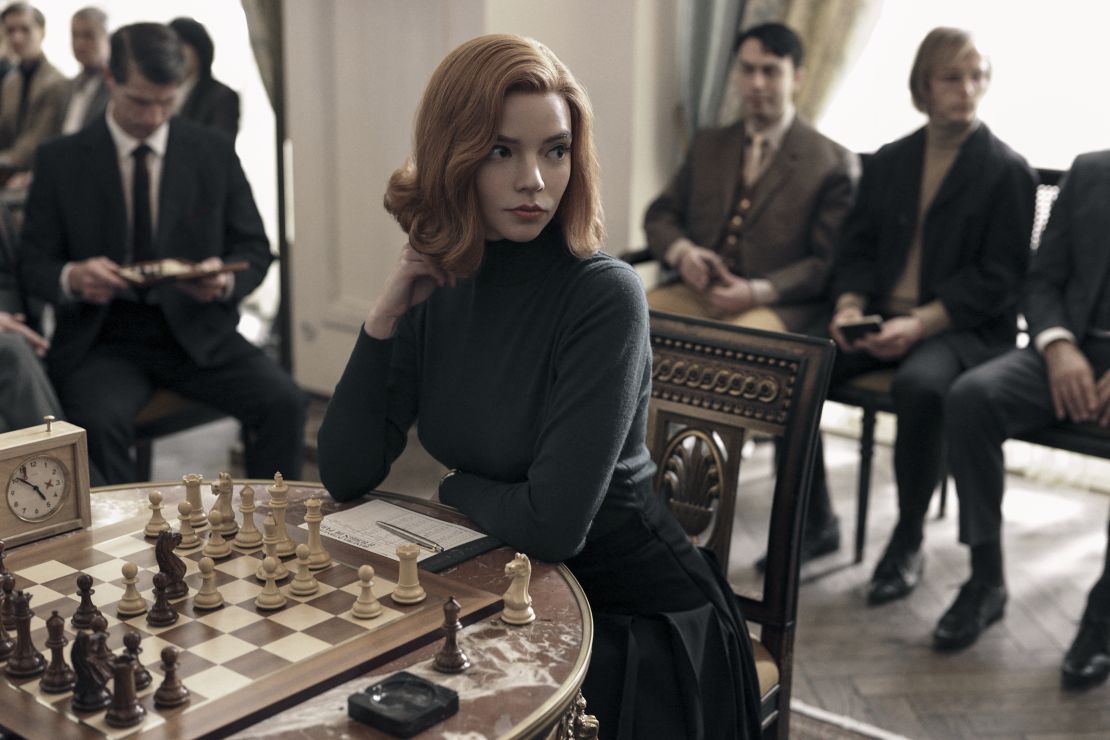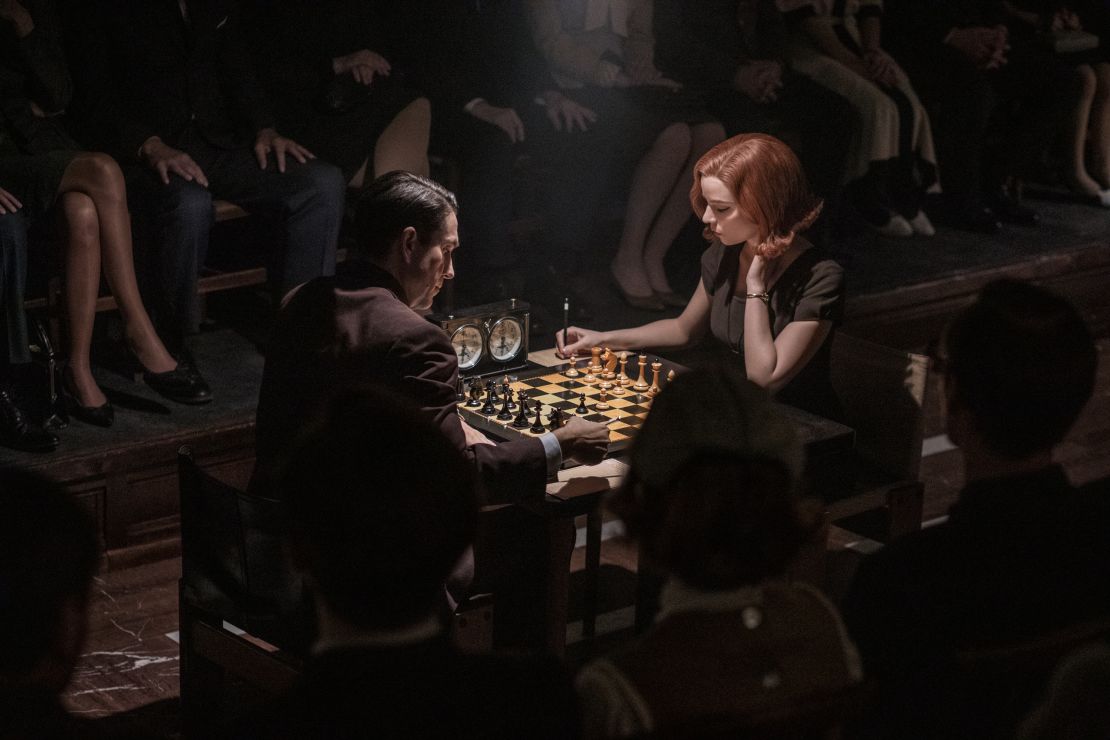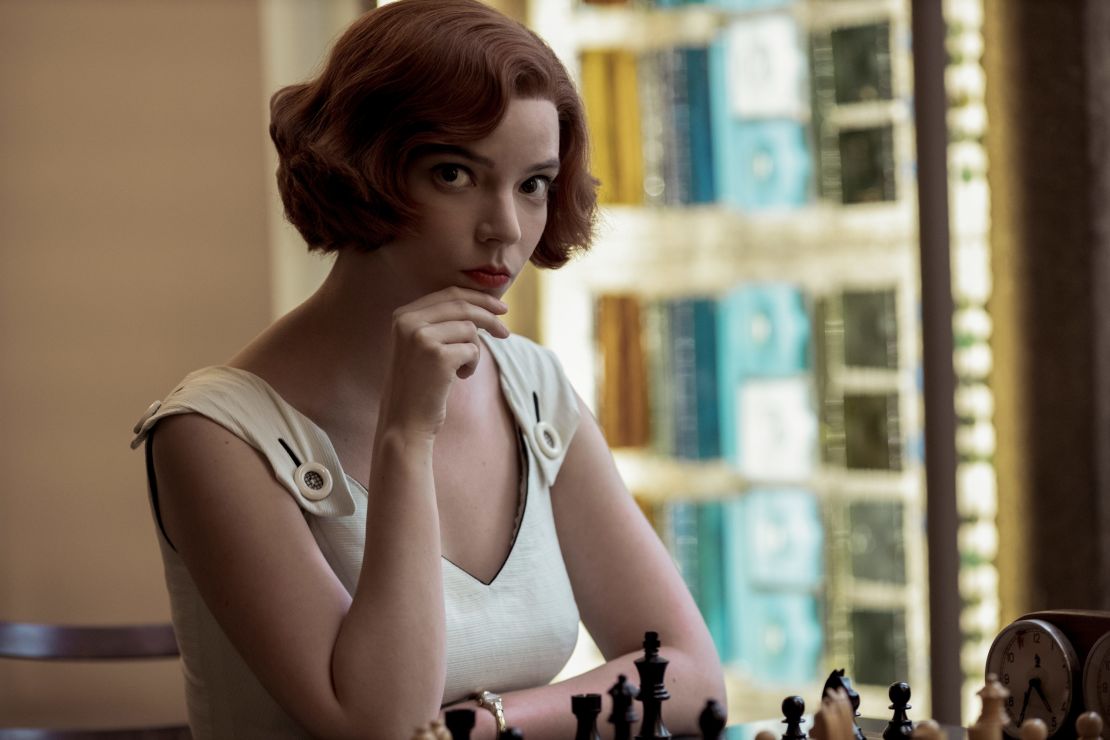David Bradley spends most weekends engaged in intense chess matches with his 15-year-old daughter, Zoe. They stare at the board for hours and plot their next moves, consumed by a new shared pastime.
Their ongoing rivalry began this fall after the Toronto father and daughter began watching the “The Queen’s Gambit,” a Netflix miniseries about a female chess prodigy. Zoe had never played chess before but took to the game quickly, Bradley said.
“She is relentless. We play from the time she gets up – noon like a lot of teenagers – to bedtime, with breaks in between,” he said. “I imagine her in her room staring at the ceiling and replaying our games.”
Bradley is 58 and grew up mastering his chess skills with his grandfather, but had not played in 15 years. Once he watched the show’s teenage protagonist upend the male-dominated world of chess with her brilliant play, he wanted to take up the game again – this time with his daughter.
They have plenty of company. Chess had already grown more popular this year as people pursue hobbies at home while under siege from the coronavirus pandemic. Then came “The Queen’s Gambit,” and interest skyrocketed. Sales of chess sets have spiked, and former casual players like Bradley are dusting off their skills.
The show is a cultural phenomenon
“The Queen’s Gambit” is a fictional story about an orphaned Kentucky girl in the 1960s who becomes (no spoilers here) a chess champion while still in her teens. The precocious main character, Beth Harmon, battles addictions to pills and alcohol – and some sexist assumptions about her chess skills – while beating one male grandmaster after another.
The show is based on Walter Tevis’ 1983 novel by the same title. It lends chess a sheen of retro cool, sending an increasingly glamorous young Beth to tournaments in Las Vegas, Mexico City and Paris while scoring points with chess enthusiasts for its authentic portrayal of the game.

Nick Barton, director of business development at chess.com, says the show has been a cultural phenomenon for chess fans. Many viewers can relate to its themes of addiction, loss, personal conflict and overcoming adversity, he said.
“It also doesn’t hurt that the chess scenes were a brilliant and mostly accurate portrayal of chess at the highest level,” Barton said.
Millions of new fans have flocked to chess.com for games, lessons and puzzles, giving the site its biggest annual growth since it launched in 2007, he said. Since March, it has added 12.2 million new members, including 3.2 million who joined after the show’s debut in late October.
Providing an escape from the pandemic
Chess has enjoyed a resurgence in recent years, with current world champion Magnus Carlsen – a young Norwegian and a former prodigy himself – becoming (almost) a household name.
The game dates back more than a thousand years and is revered for the way its seemingly simple elements – 32 pieces on a 64-square chessboard – can produce infinite strategies of attack and defense. The object of the game is to checkmate your opponent’s king by surrounding him with pieces that limit his movements.
Chess rewards players who can visualize the board in creative ways and see several moves ahead.
“There’s been a worldwide culture shift over the last decade or so in which self-improvement and acquiring new skills are more highly valued than ever before,” Barton said. “You saw this at the beginning of the pandemic as people were learning how to bake or by taking on a new language, and it’s no different with chess.”

And in a chaotic year when the outside world can seem threatening, the stability and intimacy of a chess game can provide a welcome escape.
“Chess is a game of complete information, it’s a game of certainties and equality. It’s a game of socializing, and a game of building intimate relationships,” Barton said. “I would say that under normal conditions, it’s an apt metaphor for life. But in a year of uncertainty and social distancing, it seems that 2020 and online chess are on opposite ends of the spectrum.”
Chess sets are flying off the shelves
A record 62 million households watched “The Queen’s Gambit” in its first month.
The show’s streak as one of the most popular limited series on Netflix has also led to massive interest in chess-related items.
In the first three weeks after its debut, sales of chess sets went up by 87% in the US and sales of books about chess leaped 603%, according to marketing research company NPD Group. Before 2020 sales of chess books and chess sets had remained flat or declined for years, said Juli Lennett, toy industry adviser for NPD.

Google searches for chess shot up from October to last month. And crafts site Etsy has seen a 364% increase in searches for chess items in the past month compared to the same time last year, said spokeswoman Hannah Album.
Natalie Tague, 23, bought a new chess board after watching the show. The Lyndhurst, New Jersey, resident played chess while she was younger but had lost interest in the game until she saw “The Queen’s Gambit.” Now she plays with her father and friends constantly.
A chess game is consistent and bound by rules, and provides structure at a time when there is none, she said.
“With so much inconsistency in her life, Beth uses chess as her constant,” Tague said. “It is something she can rely on daily.”
The show’s message resonates with women – and parents
Chess has traditionally been seen as a cerebral – okay, nerdy – game mostly played by men.
Hungarian Judit Polgar, widely considered the greatest female player and once the youngest grandmaster in history at age 15, believes the Netflix series can help shift that dynamic.

“It can grow the game’s promotion for girls immensely,” Polgar said last month. “And I do hope that more girls … will be supported by their parents and teachers and coaches, that if they are talented they can also reach their maximum potential.”
By spurring young people’s interest in chess, “The Queen’s Gambit” also has given parents and their children a new shared activity. Social media is filled with posts similar to Bradley’s story – parents using the show, and chess, to connect with their daughters.
As the father of a teen, Bradley said he struggles finding activities they can enjoy together. But the show and chess have become good starting points for bigger conversations.
“The lessons, like most games, involve sportsmanship, sharing strategy, patience and always being purposeful with your moves – never spontaneous,” Bradley said. “Might be a life lesson or two in there somewhere.”
The show’s portrayal of a young woman triumphing in a historically male field has also resonated. Bradley hopes it sends a message to Zoe that like the fictional Beth, she, too, can find something she’s truly passionate about – and that when she does, her talent, dedication and hard work will be rewarded.
Despite being a relative beginner, Zoe is holding her own. She hasn’t beaten her dad at chess yet, he said. But this week, for the first time, she played him to a draw.
CNN’s Matias Grez and Brandon Griggs contributed to this report

